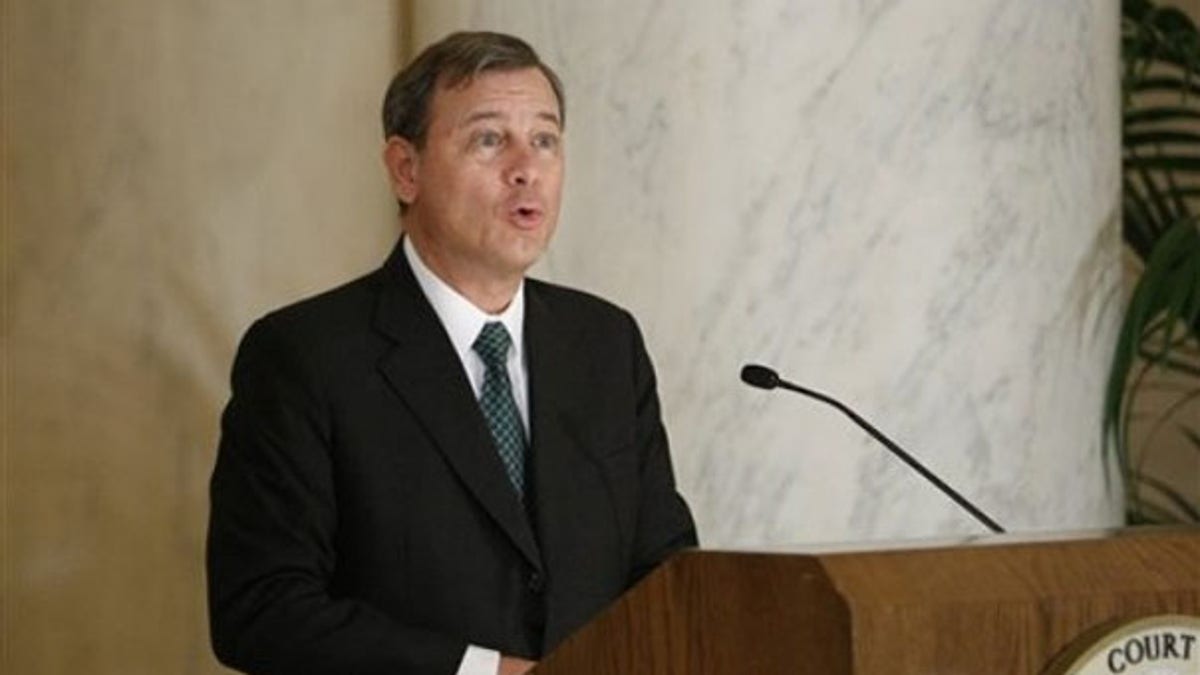
FILE: Chief Justice John Roberts (AP Photo)
President Obama was correct on both policy and decorum when he stated his views on a controversial Supreme Court ruling during his State of the Union speech attended by six Supreme Court justices, senior White House officials said Sunday.
Appearing on different Sunday television programs, Obama's senior advisor David Axelrod and press secretary Robert Gibbs defended the president's decision to express his pointed criticism of the campaign finance decision during the joint session of Congress in January.
"You know, the Supreme Court ruled that corporations have a First Amendment right," Gibbs said on "Fox News Sunday." "We believe that the president shares that First Amendment right to express what he believed was quite a bad decision by the Supreme Court."
Last week, Chief Justice John Roberts spoke publicly for the first time on the imbroglio that erupted when Obama criticized the justices for their 5-4 ruling that corporations and labor unions have a constitutional right to directly spend money on political campaigns.
The mostly partisan disagreement centered on the merits of the decision and the propriety of the setting which Obama used to issue his sharp criticism. Traditionally, Supreme Court justices remain quiet and unemotional during the annual address.
Justice Samuel Alito's clear expression of disagreement with the president -- he mouthed, "That's not true" when Obama delivered his controversial line -- flamed the fires of debate.
"The image of having the members of one branch of government standing up, literally surrounding the Supreme Court, cheering and hollering, while the court, according to the requirements of protocol, has to sit there expressionless I think is very troubling," Roberts said while answering questions from students at the University of Alabama Law School.
Axelrod disputed the suggestion that Obama's choice of setting to criticize the ruling was inappropriate. He justified the comments by comparing them to a disagreement President Theodore Roosevelt had with a dissent authored by Justice Oliver Wendell Holmes.
"Things have been said about justices by presidents in the past that were far more personal than anything the president said here," Axelrod said on ABC's "This Week."
Axelrod made specific reference to a somewhat famous observation from Roosevelt that he "could carve out of a banana a justice with more backbone than (Holmes)" who was his first appointment to the high court and had disappointed him with a dissent in a significant 1904 antitrust case.
But the historical comparison is far from on point.
"I don't think it's much of an analogy," said Edward White, author of "Oliver Wendell Holmes: Sage of the Supreme Court."
The dispute Axelrod highlighted occurred before the State of the Union speech -- then known as the president's Annual Message -- was regularly delivered in person. Roosevelt submitted his annual reports to Congress in writing.
Furthermore, Roosevelt's comments about Holmes were made in private letters. "I don't think the average citizen would have known about it at the time," White told Fox News.
Nonetheless, Axelrod said he's curious about whether Roosevelt would have approved of the decision to allow corporations and unions to directly participate in a campaign.
"I wonder what he would think about a bill that essentially allows for a corporate takeover of our elections, or a court decision. And that's what we're dealing with here," he said. "That is a threat to our democracy. It's going to further reduce the voice of the American people, and it's something we have to push back vigorously on."




